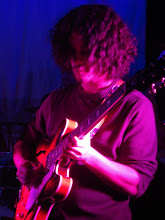Goals that people set for themselves and that are devoted to attaining mastery are usually healthy. But goals imposed by others - sales targets, quarterly returns, standardized test scores, and so on - can sometimes have dangerous side effects.
Excerpt from Drive by Daniel H. Pink
Many of the worlds greatest artists never went to university, dropped out, or were asked to leave. Without resorting to romanticized and poetic discourse about the artist’s fiery and unruly disposition, after three years of CEGEP and five months of university I can’t help but wonder why that is.
We hear repeatedly that the best way to learn about music is to play it, to listen to it, and not only to study scores but to copy them out. Yet most of us know that in this respect we are too negligent and lazy.
Rather than playing and copying out Bach’s manuscripts, gradually raising our own questions and coming to our own conclusions which we could then compare to those of an experienced professor, we are slowly fed an oversimplified and inaccurate formal system to explain his style.
But who else is there to blame except ourselves? As it turns out, scientific evidence suggests that being in school and having to complete assignments for marks decreases our motivation to do extra work independently and decreases our overall productivity in the subject in question.
Daniel H. Pink’s book Drive is about how to motivate ourselves and others in the 21st century. He distinguishes between two kinds of motivation: extrinsic and intrinsic. Extrinsic motivations include drawing a salary to do a job or getting good marks in school. Intrinsic motivation is when we want to do things ourselves purely for the enjoyment of the challenge and the satisfaction of achieving a goal.
Consider the following experiment, explained in Pink’s book. A group of school children were divided into three groups. Each group of children was asked to draw pictures. One group was offered a reward beforehand for their cooperation: a certificate with a ribbon and their name on it. The second group was not offered an incentive beforehand but received the same award at the end as a surprise. The third group was not offered a reward beforehand and did not receive one at the end.
The interesting result is that two weeks later when the researchers returned to watch the children during free play, the children from the first group who had received the incentive before drawing now showed much less interest in drawing than before the experiment when compared to children from the other groups.
Offering the children an incentive to participate decreased their future enjoyment and intrinsic motivation to take part in the future. Incentivizing the activity took something that had been enjoyable to the children and, since the activity now felt like work, made it less enjoyable.
Countless other experiments can be found in Pink’s book which show that this fact extends to adults and even monkeys. One study demonstrated that people who were given a financial incentive to solve creative and intellectual problems quickly (fastest time gets $20, for instance), the average time that group took to solve the puzzles actually increased considerably when compared to a control group.
This suggests to me that the studying of music theory in school is seriously flawed. We are constantly confronted with rules and conventions that don’t in reality exist, that are historically inaccurate, and that don’t connect to us emotionally. We are told to play along, to follow the rules, because if we don’t, we will lose marks, maybe fail the class, maybe even be forced to leave the school if too many classes are failed. Follow the rules and you will be rewarded. Don’t and face the consequences.
The unfortunate side effect of this approach for most of the population is that it creates a barrier between what they are learning in school, which is perceived as extrinsically motivated work, and their intrinsically motivated artistic expression, making it harder for the two to reflect each other. So two camps are set up, the self-glorifying academics on one side, all too conscious that their works have a basically non-existent audience, and the free but untrained ‘indie’ artist, all too conscious that their works are unsophisticated and often lack in cleverness, much like their adolescent crowd.
This may also be why the history of classical music seems so reactionary. It always seems to be a move away from the predecessor, always a disdain for the older style and those that continue to practice it, while at the same time glorifying the past as a time when people followed their instincts.
Maybe part of this trend can be explained because, having acquiring a knowledge of the old style through traditional scholastic means, it is only human nature to find something inherently unsatisfying about it. The incentive system in place while we were learning the style makes it much less interesting to us in the present.
What would happen if the presentation and integration of the traditional material was done in a less traditional way? A way which at least provided the possibility for intrinsic motivation to take hold rather than trying to squash it entirely, deliberately asking you to check your own propelling sense of self-motivation at the door? What would happen if the study of theory was an opinionated and creative experience? Maybe the polarization of emotional expression on one side and intellectual complexity on the other would be less of an issue in contemporary classical music? Maybe the products churned out by hard working academic composers would begin to find a larger audience? Maybe the whole educational process would be more enjoyable, more rewarding, and above all, more inspiring?
Subscribe to:
Post Comments (Atom)

No comments:
Post a Comment